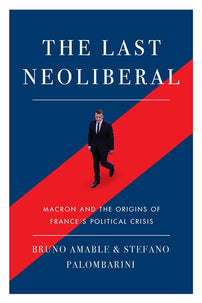France needs to build a left that breaks with neoliberalism
Cédric Durand, Razmig Keucheyan and Stefano Palombarini put forward a series of proposals for building a Left in France that breaks with neoliberalism. In particular, they emphasise the key responsibilities that this implies for France Insoumise.

In France, the unexpected outcome of the parliamentary elections on 7 July has created a new political situation, which has accelerated the crisis of Macronism. This has also forced the Left to reckon with its own responsibilities. In this op-ed originally published by Contretemps, Cédric Durand, Razmig Keucheyan and Stefano Palombarini put forward a series of proposals for building a Left that breaks with neoliberalism. In particular, they emphasise the key responsibilities that this implies for France Insoumise.
///
The French political situation is changing fast. It has four key elements:
1/ The Rassemblement National is still lying in wait. Its failure in the parliamentary elections — which should be seen in rather relative terms, given that this party nonetheless doubled its number of MPs — can be credited to two factors in particular. Firstly [unlike what has normally happened since the 2000s] these parliamentary elections did not follow directly after a presidential election, in which case the momentum of the one contest might have carried over to the other. The fact that these were more stand-alone contests tended to favour the most territorially-rooted parties. Secondly, there was an effective “republican barrage” against the Rassemblement National, which was mainly the doing of the Left. For now, at least, these factors kept the rise of the Rassemblement National within certain limits. But there is no guarantee that they will continue to hold in future. Above all, there is a rising fascisation within French society, with an increase in racist acts and speech from one day to the next. Whole sectors of the bourgeoisie are swinging to this camp. We see this with the part of Les Républicains [historically the main conservative party] led by Éric Ciotti [who allied with Marine Le Pen] or the positive reception which the stock markets gave to the prospect of a Rassemblement National government on the night of the first round.
2/ Macronism is collapsing as quickly as it first appeared. The “bourgeois bloc” has always been an illusion, but it has now been shown that it has no majority either in the country or within the institutions. This is surely a good thing, as a renewed polarisation between Left and Right should clarify the political field for future elections.
3/ Having been given up for dead in 2017, the Parti Socialiste is back. In terms of its number of MPs, it is now virtually on a par with France Insoumise. The Parti Socialiste controls five regions, a large number of cities, and it is the second-biggest political force in the Senate. The founding hypothesis of the Nouveau Parti Anticapitaliste and then France Insoumise, which held that the crisis of social democracy would automatically leave the field open to radical forces on the Left, has clearly been disproven. Our strategy needs to be rethought from top to bottom. The radical left is not alone on the Left, and we need to integrate this fact into our approach once and for all.
[book-strip index="1"]
4/ Despite a significant increase in its number of votes at the 2024 European elections compared to the last such contest in 2019, France Insoumise’s relative weight within the Left has weakened since the 2022 presidential election. This can be seen, among other indicators, in its difficulty in imposing its preferences on the other parts of the Nouveau Front Populaire when it comes to appointing the prime minister and the presidency of the National Assembly. What a difference from the 2022 parliamentary elections! The dismal spectacle of purges of candidates, carried out at the worst possible moment, surely has not helped. It gave the impression that France Insoumise was attacking those closest to it politically, rather than devoting its efforts to fighting the fascists and to strengthening, within the left-wing space, the positions of those who want a clean break with France’s neoliberal course.
Thus, we can now identify an electoral field made up of four blocs. There is (1) the Rassemblement National; (2) a Right formerly known as “republican”, at the intersection between Macronism in terminal crisis and Les Républicains — a camp embodied by [Macron’s former prime minister] Édouard Philippe; (3) an openly neoliberal left, of which Raphaël Glucksmann’s European election campaign [heading the Parti Socialiste–Place Publique list] is the paradigmatic case; and (4) the Left that fights for a break with neoliberalism. The boundaries of these four blocs are ever-shifting. They are joined by abstainers: the leading “party” among the popular classes.
La France Insoumise is at the heart of the Left that fights for a break with neoliberalism. This is in fact the only one of the four blocs that stands outside of a neoliberal ideological paradigm. While this paradigm shows signs of likely irreversible crisis, it remains the one that structures the worldview of the majority. So, we cannot hide away from the fact that this left-wing bloc is still in a weak position as far as building hegemony is concerned. It is therefore essential to broaden its scope, and, from this point of view, La France Insoumise has a fundamental responsibility.
This requires political work, in particular aimed at abstainers, young people and the popular classes — something that La France Insoumise has done remarkably well at in recent years. But to reach a higher level and hope to govern, we also need to bring together established political and social forces, each with their own influence in various parts of society and in the political arena. This means the trade unions, associations, and other parts of the Left, including the Parti Communiste Français, at least part of the Greens, some Socialists, the Nouveau Parti Anticapitaliste and the “dissidents” from France Insoumise itself.
In September, all these forces could take the initiative in forming Assemblies of the Nouveau Front Populaire — an alliance that needs to lay down strong roots, within the perspective of a break with neoliberalism. With others, La France Insoumise could be the linchpin of building a genuine popular base for what currently remains no more than a pact between party apparatuses. But one of the obstacles to doing this is the nature of La France Insoumise itself. For, while it functions as an extremely effective electoral machine, it has virtually no grassroots structure.
La France’s Insoumise’s so-called “gaseous” organisational form will not be able to withstand the coming fascism. If we want to fight this latter effectively — and, more generally, create the conditions for transformation within the state apparatus and society as a whole — we need to build an organisation worthy of the name. The Assemblies of the Nouveau Front Populaire could set in motion a dynamic of this kind. This would not prevent existing organisations from continuing to exist and interact. But this would create a grassroots base, forcing the party apparatuses to take account of the interests of the Nouveau Front Populaire as a whole. To have an effective and lasting influence on the future of the Left, in these Nouveau Front Populaire Assemblies and beyond, La France Insoumise will have to transform itself.
An idea well-established in the France Insoumise leadership group holds that the movement is to be constructed through a series of “clarifications”. What this means is that individuals and collectives who do not follow the line decided by Jean-Luc Mélenchon and his entourage are progressively excluded from its ranks. This has proven effective when it came to building a perspective for a Left breaking with neoliberalism, by saving it from the wreckage of Hollandism [François Hollande’s line as Parti Socialiste president in 2012–17 and since]. But it is entirely at odds with the demands of the political phase that we are going through. Today, La France Insoumise has to fulfil the role of organiser and pivot of a social bloc which can only expand if it also allows a certain internal diversity.
If being part of La France Insoumise demands unvarying faith in a line decided by just a small number of people, the effect will be to encourage the resurgence of its political competitors, first and foremost the Parti Socialiste and the Greens. We need to build hegemony on the Left and in the country as a whole. But hegemony is the opposite of exclusion: it means bringing together diverse political and social forces, while exercising what Antonio Gramsci called a capacity for leadership over them, whereby they have to respond to our chosen themes.
[book-strip index="2"]
Only a Left that breaks with neoliberalism can save France from the multiple crises that it is going through. To do that, we need a La France Insoumise that is confident in the strength of its ideas and its organisational capacity. In ideological terms, its ability to shift the terms of left-wing politics was crystallised in the [NUPES and Nouveau Front Populaire] joint programmes in 2022 and 2024, which make an unambiguous break with neoliberalism.
In organisational terms, however, La France Insoumise is faltering. We can see this in its inability to set in motion a dynamic of building up cumulative organisational growth. Its roots in various parts of French society are not embodied in concrete structures, but in individuals with a symbolic function. To grow, i.e. to bring together diverse social sectors and make them active within the organisation itself, La France Insoumise needs an internal pluralism, based on collectively decided rules. This pluralism is a marker of effectiveness and will enable it to spread its influence beyond the boundaries of the movement itself.
La France Insoumise’s operations are based on a small apparatus, made up of no more than a dozen people with exceptional organisational skills. They organise the practical commitment of thousands of activists devoted to the cause. But this type of organisation is not suited to the ambition of building real and lasting hegemony on the Left and in society. We need to expand and to delegate, and to do that we need to build forms of legitimacy that go beyond direct contact with Jean-Luc Mélenchon and his immediate entourage.
In practical terms, this means that La France Insoumise must start right away in formalising its operating principles, with effective rules for democratic control of the movement’s leadership and resources. This is the necessary condition to avoid its internal political dynamic being reduced to a game of make-believe, in which militants who want to be active in La France Insoumise have to accept a form of depoliticisation. Lacking any possibility of influencing La France Insoumise’s future course, its body of activists is infantilised — and the effect will be to push the most vibrant forces away from its ranks.
This does not mean that La France Insoumise will become a talking shop for hair-splitters, or the plaything of personal ambitions, or that it will be forced to seek dubious syntheses between rival currents. The opposite is true. Internal disputes and personal ambitions can and must be contained within strict limits. There have been many organisations in the history of the Left which, while accepting a certain degree of internal debate and disagreement, have made their mark on French society. Collective action requires collective intelligence. It is the combination of the two that will increase La France Insoumise’s capacity for hegemony.
Translated by David Broder

